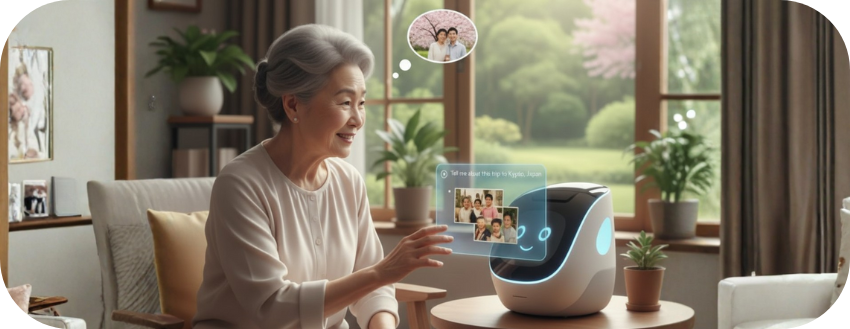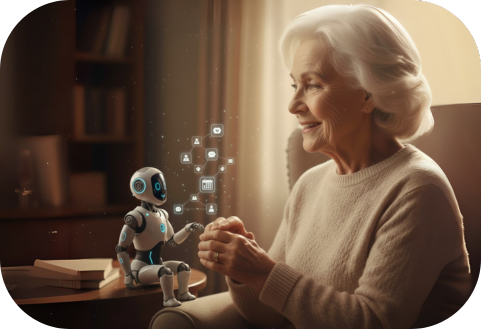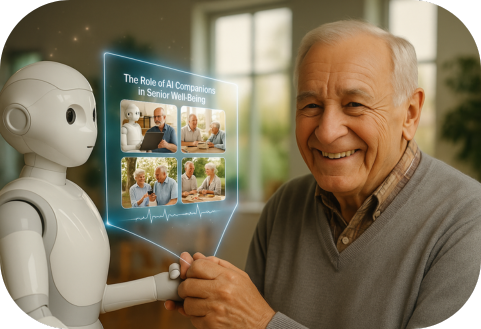Alzheimer’s Care for Seniors: How ReComune Makes a Difference?
Alzheimer’s disease is one of the most prevalent and challenging neurological conditions affecting seniors today.
Updated on: 26 Jan 2026

In today’s fast-evolving and emotionally connected digital world, Artificial Intelligence (AI) is no longer confined to sterile tech companies or hidden research labs it has gracefully entered homes, hospitals, and vibrant senior living communities. Among its most inspiring and transformative breakthroughs is the creation of AI companions intelligent, caring, and empathetic digital entities designed to engage, comfort, uplift, and assist seniors in their everyday lives. As the global aging population expands at an unprecedented pace, AI companions are emerging as powerful, life-enhancing allies rather than futuristic novelties.
They bring hope, joy, and reassurance to millions of older adults, acting as trusted friends who enrich emotional well-being, sharpen cognitive abilities, and promote physical vitality. According to the World Health Organization (WHO), the number of people aged 60 and above will skyrocket to over 2.1 billion by 2050 a figure that speaks volumes about our collective responsibility to care for this growing generation. As the elderly population grows, challenges such as loneliness, emotional distress, depression, and cognitive decline have become more urgent and heart-wrenching.
AI companions are intelligent digital or robotic assistants powered by machine learning, natural language processing (NLP), and emotion recognition technologies. Unlike typical smart devices, these systems are designed to build ongoing relationships with their users. They can:
Examples include robotic pets like Joy for All Companion Pets, voice assistants such as Amazon Alexa or Google Assistant, and more advanced AI-driven platforms like ElliQ, Replika, and ReComune all designed to bring comfort, engagement, and connectivity to seniors.
Loneliness among seniors has become a silent epidemic. Studies by the (National Institute on Aging) indicate that one in three seniors experiences social isolation, which can increase the risk of dementia by 50% and premature death by 26%. These numbers underscore the urgent need for innovative solutions that go beyond traditional caregiving. AI companions offer a unique advantage they provide constant availability, personalized engagement, and emotional consistency, all of which are crucial to maintaining a senior’s sense of purpose and connection.
The science behind AI companionship combines artificial intelligence, emotional analytics, and behavioral psychology to develop empathetic systems that understand feelings, simulate human connection, and enhance seniors’ emotional, cognitive, and social well-being.

Modern AI companions utilize emotion recognition algorithms that analyze speech tone, facial expressions, and behavioral patterns to respond empathetically. This means they can detect sadness, joy, or frustration and tailor their responses accordingly. According to a 2022 study by the, seniors who interacted with AI companions for six weeks showed a 35% reduction in feelings of loneliness and an 18% improvement in mood consistency (National Institutes of Health (NIH). These digital friends don’t just respond they remember. Machine learning allows AI systems to adapt to each user’s personality and habits, making interactions feel personal and authentic.
AI companions can also help combat cognitive decline. Through games, quizzes, storytelling, and conversational prompts, they stimulate brain activity and encourage memory recall. A study published in the Journal of Aging and Mental Health found that seniors who used AI-based memory games for 30 minutes a day experienced a 12% improvement in short-term memory and a 22% improvement in cognitive focus (National Institute on Aging).

In addition to emotional and mental support, AI companions promote physical well-being. Many integrate with wearable health devices to monitor vitals such as heart rate, blood pressure, and sleep patterns. They can alert caregivers in case of irregularities and remind users to stay hydrated, take medication, or perform light exercises.
AI companions bring a wave of comfort, empathy, and reassurance into the lives of seniors, transforming loneliness into connection and silence into joyful engagement. These intelligent partners offer warmth, compassion, and understanding, creating a safe emotional space where seniors feel heard, valued, and cherished. By fostering trust, confidence, and positivity, AI companions encourage older adults to embrace each day with renewed hope, vitality, and purpose. Their presence not only nurtures emotional resilience and happiness but also reminds seniors that aging can be a journey filled with love, laughter, and meaningful companionship.
One of the most profound benefits of AI companions is their ability to mitigate loneliness. They offer daily conversation, listen attentively, and respond with warmth. While not a replacement for human interaction, AI companions help bridge the emotional gap between family visits and daily solitude. According to (AARP 2021), seniors using AI social robots reported a 45% decrease in self-reported loneliness.
Through motivational messages and uplifting interactions, AI companions can boost morale. They can help seniors start their day with affirmations, remind them of their achievements, and encourage gratitude practices. Emotional words like “You are doing great today” or “Let’s enjoy this beautiful morning together” can have a measurable impact on mood.
Unlike human relationships that may be affected by judgment or misunderstanding, AI companions offer unconditional acceptance. Seniors can express emotions freely without fear of criticism. This psychological safety encourages open communication, promoting mental resilience and self-esteem.
AI companions are evolving beyond generic voice assistants. With the help of machine learning algorithms, they now learn from past interactions to build familiarity and emotional continuity. For example, ElliQ AI companion developed by Intuition Robotics, tailors conversations based on the user’s previous activities, preferences, and emotional tone. ReComune AI Companions is a genuine sense of companionship, recalling previous conversation with real sense of moral support in positive and supporting suggestions. The AI might recall, “You mentioned enjoying gardening last week. How are your roses doing today?” a small but deeply human touch that reinforces connection.

ElliQ is a conversational robot designed specifically for seniors. It uses voice, gestures, and touch to interact naturally. Studies show that seniors using ElliQ for six months experienced a 25% increase in social engagement and a 17% improvement in daily motivation (Intuition Robotics, 2023).
ReComune is an AI-powered platform designed to connect seniors with AI Companion anytime from anywhere for a positive and productive conversation to end seniors loneliness. ReComune – AI Companionship bridges the gap offering seniors trusted, on-demand conversation, empathy, and emotional support that helps them feel connected. It encourages intergenerational bonding and has been shown to reduce loneliness levels by 40% among users.
For seniors who may not feel comfortable with human-like AI, robotic pets such as the Joy for All Cat and Dog offer soothing companionship through gentle touch and lifelike responsiveness. These adorable, low-maintenance companions deliver the emotional comfort of a pet without the responsibility. According to a 2021 University of Exeter study, such AI-powered pets reduced anxiety by 33% and enhanced mood stability among older adults, fostering calm and happiness (University of Exeter Study).
While AI companions bring numerous benefits, ethical concerns must be addressed:
Solutions include implementing transparent AI ethics policies, ensuring affordable access, and designing user-friendly interfaces tailored to seniors’ needs.
The next decade promises exciting advancements. With improvements in natural language understanding, emotion AI, and robotic design, AI companions will become even more lifelike and emotionally intelligent. Researchers predict that future AI companions will be able to detect subtle emotional cues such as stress through voice modulation or micro-expressions, responding with empathy-driven dialogue. Additionally, the integration of virtual reality (VR) and augmented reality (AR) could allow seniors to interact with their AI companions in immersive environments joining virtual gardens, concerts, or family events (PureLogics).
AI companions don’t replace human love, they enhance and celebrate it. These compassionate technologies bring warmth, structure, and hope to seniors, transforming aging into a journey of connection, joy, and purpose. Beyond simple assistance, AI companions empower older adults to live independently, embrace emotional vitality, and rediscover everyday beauty. More than digital tools, they serve as beacons of comfort, confidence, and courage for a generation deserving of care and respect. As technology evolves, the partnership between humans and AI deepens, creating bridges of compassion that guide seniors from isolation to inclusion, loneliness to laughter, and aging to thriving.